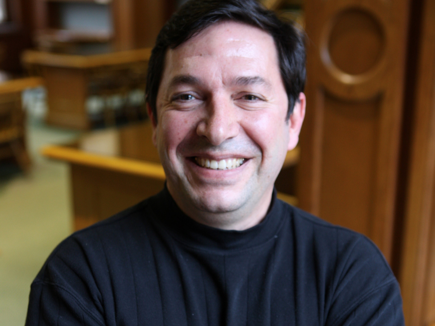Juan M. Restrepo
Oak Ridge National Laboratory
Oak Ridge, Tennessee, U.S.
Department: Mathematics in Computation Section
Education: B.S. Music (major) and Philosophy (minor), New York University, M.S. Engineering, Penn State University Ph.D. Physics, Penn State University
Career stage: Late

What do you do?
As section head, I am responsible for the science management for the mathematics in computation section (about 25% of my time); this includes the management and development of mathematics capabilities that support the laboratory and DOE science research mission; the other 75% of time is spent leading research in statistical physics related to non-equilibrium dynamics with applications in climate and systems biology, data science, probabilistic high-performance computing, and machine learning applications to data and dynamics.
What types of skills do you use?
I leverage my creativity to propose scientific research questions and research directions. I use my ability to collaborate with others who have skills I am less familiar with to tackle big problems; my experience in teaching to mentor and communicate; my computing skills to push through when theoretical means hit a challenge for progress; and my theoretical skills when my computing skills hit a challenge for progress.
How are applied mathematics and/or computational science important to what you do?
Central: my goal is to develop new mathematics and algorithms that can lead to significant progress in the sciences.
What are the pros and/or cons of your profession/job?
Pro: I spent 30 years in academia and loved every minute of it, working on whatever I found interesting. I am now working in big science and large collaborations and love the challenges of mission-oriented research.
Does your job offer flexibility?
My current job offers far less flexibility than my job as a faculty member — this is big, collaborative, research. However, I am afforded greater flexibility regarding pursuing various science domains.
What career path did you take to your current position?
I was very deliberate in my shift from academic to government laboratory work.
Was your career path well planned or a result of taking opportunities as they arose?
There was little by way of deliberate planning. I have an irrepressible penchant for adventure and taking chances.
What advice would you give to someone pursuing a similar degree or profession?
Focus first on developing expertise (help yourself before helping others). Find mentors who can give good and sincere advice.
Was there anything that surprised you when you started out in your career?
I had no expectations to turn to science, never mind succeeding in it. Hard work, humility, determination, and passion paid off. Along the way, there were many people who were generous with their time and whose impact on my career has been dramatic and hard to underestimate.
Has SIAM played a role in helping you build your career?
From the time I was a student to the present, SIAM has been a continual guide and supporter in my career. I have found mentors, collaborators, friends, and plenty of sage advice within the SIAM community. SIAM has been a publisher of many affordable and great texts, SIAM Review offers great material for teaching, and book reviews have been very useful. SIAM has an affordable first-rate journal publication model.
Salary
The Department of Energy offers very good life/work balance, good salaries, and good career progression opportunities for applied mathematicians and data scientists, starting with very generous postdoc salaries and benefits.
Stay Up-to-Date with Email Alerts
Sign up for our monthly newsletter and emails about other topics of your choosing.

